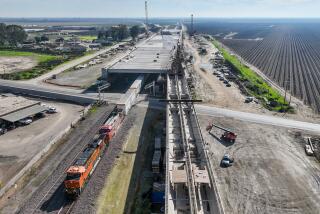Keystone XL pipeline: New route proposed through Nebraska
TransCanada has revealed the route it would like to use to build the Keystone XL oil pipeline through Nebraska, where the $7-billion project has become mired in concerns over the nation’s most important agricultural aquifer.
A new report submitted by the Canadian pipeline company to the Nebraska Department of Environmental Quality shows an alternative route for the pipeline, designed to carry diluted bitumen from the tar sands of Alberta province to U.S. refineries. That route would run to the east of the sensitive Sandhills region of northwestern Nebraska, according to official maps.
The pipeline, seen by advocates as a crucial piece of new infrastructure to deliver North American energy supplies to market, became roadblocked earlier this year when President Obama vetoed it over concerns about what could happen if it leaked into the porous, sandy soils atop the Ogallala aquifer.
The proposed new route still goes over the aquifer — which underlies much of Nebraska — but it avoids those areas of the Sandhills where groundwater lies under porous grasslands extremely close to the surface.
Submission of the new route clears the way -- under legislation passed by the state Legislature last week -- for state authorities to begin reviewing the revised project in detail. Assuming Nebraska Gov. Dave Heineman signs off on the new route after those reviews, TransCanada would have much of the political backing it needs to win approval from the U.S. State Department for an international permit to build the pipeline.
New federal environmental studies also will be forthcoming, even as Nebraska conducts a series of formal public hearings on the route.
“Public participation will be important throughout this review, and NDEQ will make every effort to provide information and invite comment throughout the process,” Mike Linder, head of the Nebraska Department of Environmental Quality, said in a statement.
TransCanada spokesman Shawn Howard said the new route reflects TransCanada’s commitment to pursue a plan acceptable to Nebraska residents.
“Once again, this process is back in the hands of Nebraskans, who overwhelmingly support the safe construction and operation of this critical North American energy infrastructure project,” Howard said in a statement. “The need for the real jobs that Keystone XL will create has not diminished, nor has the desire to reduce America’s dependence on foreign oil.”
But whether the alternative route will resolve concerns about protecting the aquifer is uncertain. Pipeline opponents have long said that merely moving the pipeline east of the Sandhills won’t guarantee safety, because other areas with sandy soils and high water tables could also be problematic.
According to TransCanada’s new report, the new route would not cross any areas where groundwater lies less than five feet below the surface. But about 35 miles of the pipeline would cross over groundwater that is less than 20 feet below the surface.
Jane Kleeb of BOLD Nebraska, a group of environmentalists, ranchers and other citizens fighting the pipeline, takes issue with the official designation of the Sandhills location. Although the new route avoids the area defined by the state as the Sandhills, the Sandhills themselves actually extend farther than the state map shows, she said.
“I am literally standing with a landowner whose land this pipeline still crosses in the Sandhills. So unless I am standing on a mirage, it still crosses the Sandhills,” Kleeb said in a statement on the group’s website. “If TransCanada cared about our state, landowners, water and Sandhills, they would have proposed a safer, more responsible route instead of trying to play games with landowners.”
RELATED:
Nebraska Legislature moves forward on Keystone XL pipeline
Obama’s Keystone XL announcement under attack by both sides
TransCanada forges ahead on two fronts in effort to build extension
kim.murphy@latimes.com
More to Read
Sign up for Essential California
The most important California stories and recommendations in your inbox every morning.
You may occasionally receive promotional content from the Los Angeles Times.










